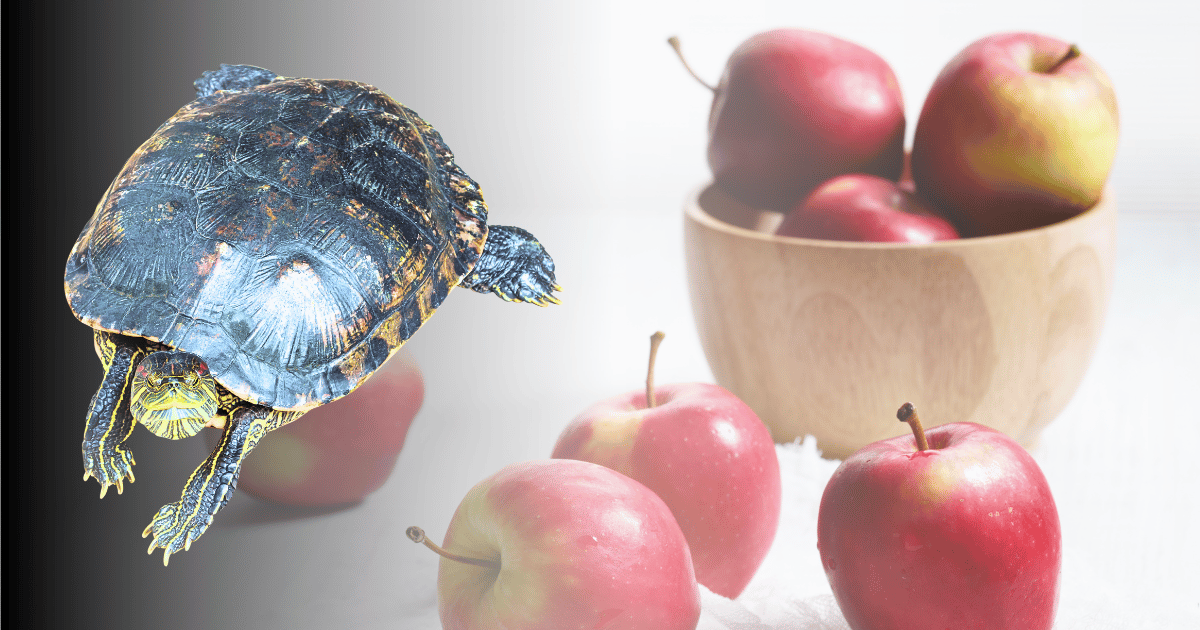 Turtles are known to have a varied diet, and they can eat a wide range of fruits and vegetables.
Turtles are known to have a varied diet, and they can eat a wide range of fruits and vegetables.
However, not all fruits and vegetables are suitable for turtles, and it’s important to know which ones are safe to feed them.
One question that often comes up is whether turtles can eat apples.
The short answer is yes, turtles can eat apples.
Apples are a good source of vitamins and minerals, and they can be a healthy addition to a turtle’s diet. However, it’s important to feed them in moderation, as too much fruit can lead to health problems.
In addition to apples, there are other fruits and vegetables that are suitable for turtles, and it’s important to provide them with a balanced diet.
Key Takeaways:
- Turtles can eat apples, but they should be fed in moderation.
- A balanced diet is important for the health of turtles, and it’s important to provide them with a variety of fruits and vegetables.
- Consulting a veterinarian who specializes in reptile nutrition can be helpful in ensuring that your turtle is getting all the nutrients they need.
Nutritional Value of Apples for Turtles
Apples are a good source of vitamins and minerals, including vitamin C, fiber, and potassium.
Turtles can benefit from the nutritional value of apples, but they should not be the only fruit in their diet.
Turtles require a variety of fruits and vegetables to meet their nutritional needs.
Precautions to Take When Feeding Apples to Turtles
When feeding apples to turtles, it is important to take some precautions to ensure their safety and health. Here are some tips to keep in mind:
- Feed apples in moderation. Apples are high in sugar and should be given as a treat rather than a staple food.
- Cut the apple into small pieces. Turtles have small mouths and can choke on large pieces of food.
- Remove the seeds and core. The seeds and core of an apple contain cyanide, which can be toxic to turtles.
- Wash the apple thoroughly before feeding it to your turtle. Pesticides and chemicals on the skin can be harmful to your pet.
It is important to note that not all species of turtles can eat apples.
Some turtles, such as the desert tortoise, have a specialized diet and should not be fed fruits or vegetables. Always check with your veterinarian to determine the nutritional needs of your pet turtle.
Other Fruits and Vegetables Suitable for Turtles
Fruits for Turtles
Fruits are a great source of vitamins and minerals for turtles. However, it is important to remember that fruits should be given in moderation as they are high in sugar.
Here are some fruits that turtles can eat:
- Apples (without seeds)
- Berries (strawberries, raspberries, blueberries, blackberries)
- Melons (watermelon, honeydew, cantaloupe)
- Bananas
Vegetables for Turtles
Vegetables are an important part of a turtle’s diet as they provide essential nutrients and fiber. Here are some vegetables that turtles can eat:
- Carrots (grated or sliced)
- Spinach
- Kale
- Leafy greens (lettuce, collard greens, dandelion greens)
It is important to note that some vegetables, such as broccoli and cauliflower, should be given in moderation as they can cause gas. Additionally, vegetables should be washed thoroughly before feeding to turtles.
The Importance of a Balanced Diet for Turtles
Nutritional Needs of Turtles
Turtles are omnivores, which means they eat both plant and animal matter. Their diet should be balanced and provide them with all the necessary nutrients, vitamins, and minerals they need to stay healthy.
Some of the essential nutrients that turtles require include protein, calcium, fiber, potassium, vitamin C, vitamin A, magnesium, and antioxidants. These nutrients help turtles maintain healthy skin, shells, and internal organs.
Calcium is particularly important for turtles, as it helps keep their shells strong and healthy. Turtles that don’t get enough calcium in their diet can develop metabolic bone disease, which can be fatal if left untreated.
Feeding Turtles a Balanced Diet
To ensure that your turtle is getting a balanced diet, you should offer them a variety of foods. Feeding your turtle a diet that consists solely of pellets can lead to nutrient deficiencies and health problems.
In addition to pellets, you can feed your turtle a variety of foods, such as insects, earthworms, snails, fish, and aquatic plants. The specific foods you should offer your turtle will depend on their species and age.
Baby turtles, for example, require a diet that is higher in protein and calcium than adult turtles. Painted turtles and box turtles are primarily herbivores and require a diet that is high in dietary fiber. Aquatic turtles, on the other hand, require a diet that is higher in protein and animal matter.
When feeding your turtle, it’s important to offer them a variety of foods to ensure they are getting all the necessary nutrients. You should also avoid feeding your turtle too many treats, as these can be high in natural sugars and may not provide the necessary nutrients.

I have a big soft spot for turtles. I grew up near a pond that was full of snapping turtles. Now and then I’d see them crawling across our front yard, which was always exciting.
Now I write about turtles for this website as a fun side hobby. Glad you stopped by!

